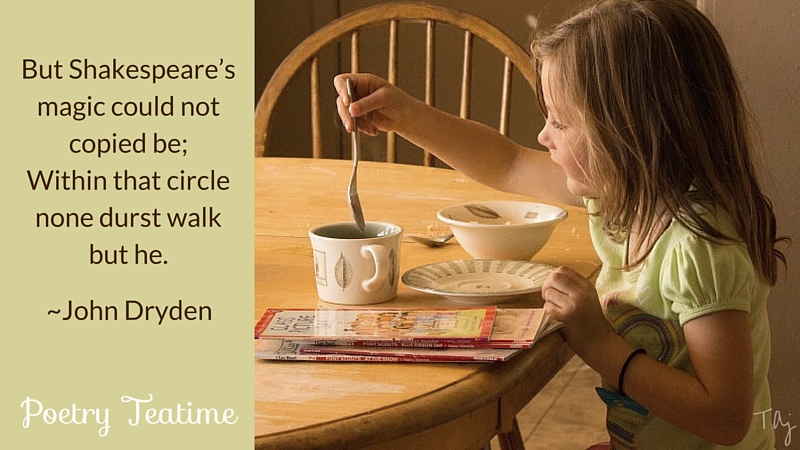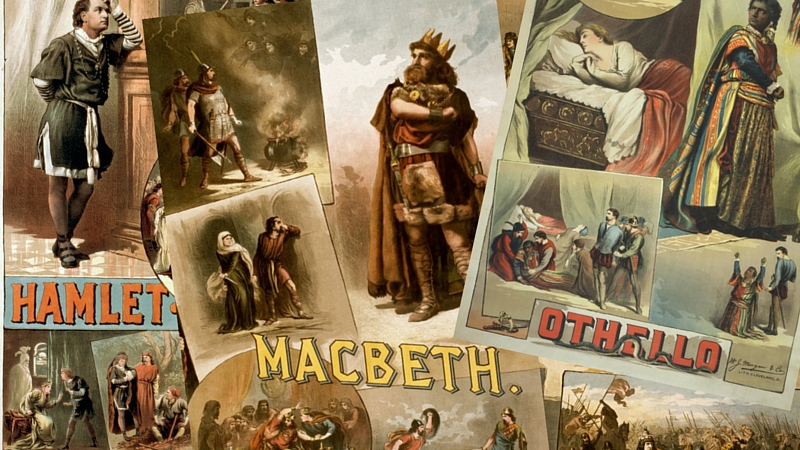William Shakespeare is thought to have been born on April 23rd, and he died on April 23rd, making April the perfect month to celebrate the most influential writer in the English language. Here are some ideas for a Poetry Teatime fit for the Bard.
Although Shakespeare is a household name today, the playwright himself probably spelled his name differently. Sources from Shakespeare’s time spell his name in over eighty different ways, including “Shaxbard.” Some scholars even speculate that Shakespeare, who never went to college or traveled widely, could not have written the complex and sophisticated works that are attributed to him.
Shakespeare wrote 37 (known) plays and 154 sonnets. Shakespeare also acted in his own theater company, performing in front of Queen Elizabeth I and King James I.
But in case you aren’t convinced that Shakespeare is all that great, here are just a few of the many phrases we have thanks to Shakespeare. Imagine trying to carry on a normal conversation without using a single phrase that Shakespeare invented! According to the Oxford English Dictionary, over 3,000 words first appeared in Shakespeare’s work.
- Break the ice
- Catch a cold
- Breathed his last
- Dead as a door nail
- Good riddance
- Greek to me
- Heart of gold
- Household words
- In your mind’s eye
- Laughing stock
- Love is blind
- Not slept one wink
- Neither rhyme nor reason
- Refuse to budge an inch
- Seen better days
- Set your teeth on edge
- Sorry sight
- Too much of a good thing
- Wild goose-chase

What to Read
For your Shakespearean Poetry Teatime you might share a sonnet. Here's one of Shakespeare's most well-known 14-lined poems.
Sonnet No. 18
Shall I compare thee to a summer's day?
Thou art more lovely and more temperate.
Rough winds do shake the darling buds of May,
And summer's lease hath all too short a date.
Sometime too hot the eye of heaven shines,
And often is his gold complexion dimmed;
And every fair from fair sometime declines,
By chance, or nature's changing course, untrimmed;
But thy eternal summer shall not fade,
Nor lose possession of that fair thou ow'st,
Nor shall death brag thou wand'rest in his shade,
When in eternal lines to Time thou grow'st.
So long as men can breathe, or eyes can see,
So long lives this, and this gives life to thee.
Analysis of poetry is not required during teatime, but if your kids ask questions or the conversation veers in that direction you might find the commentary on the sonnets on this website helpful.
Humorous Scenes
Your kids might get a kick hearing (or reading) a funny scene from one of the plays. For example, take the following from Much Ado about Nothing where Benedick and Beatrice spare verbally with each other.
BENEDICK: What, my dear Lady Disdain! are you yet living?
BEATRICE: Is it possible disdain should die while she hath such meet food to feed it as Signior Benedick? Courtesy itself must convert to disdain, if you come in her presence.
BENEDICK: Then is courtesy a turncoat. But it is certain I am loved of all ladies, only you excepted: and I would I could find in my heart that I had not a hard heart; for, truly, I love none.
BEATRICE: A dear happiness to women: they would else have been troubled with a pernicious suitor. I thank God and my cold blood, I am of your humour for that: I had rather hear my dog bark at a crow than a man swear he loves me.
BENEDICK: God keep your ladyship still in that mind! so some gentleman or other shall 'scape a predestinate scratched face.
BEATRICE: Scratching could not make it worse, an 'twere such a face as yours were.
BENEDICK: Well, you are a rare parrot-teacher.
BEATRICE: A bird of my tongue is better than a beast of yours.
BENEDICK: I would my horse had the speed of your tongue, and so good a continuer. But keep your way, i' God's name; I have done.
You might also pick out other monologues and have each guest perform one dramatically. There are monologues for male and female roles, and plenty of good speeches to fight dramatically over!
Shakespeare Collections
[This sections contains Amazon affiliate links. Thank you for supporting Poetry Teatime!]
A number of books share easy to understand retellings of the plays.
- Shakespeare Stories by Leon Garfield
- Tales from Shakespeare by Charles and Mary Lamb
- Beautiful Stories from Shakespeare by Edith Nesbit
- Stories from Shakespeare by Geraldine McCaughrean
- Illustrated Stories from Shakespeare published by Usborne
- Tales from Shakespeare by Marcia Williams (Shakespeare in comic strip form!)
- Shakespeare’s Complete Sonnets (Dover)

Activities
Talk like Shakespeare!
Use words like “methinks” or “forsooth,” and add “-eth” to all verbs (“drinketh” the tea, “eateth” the scones).
Hurl Shakespearean insults at each other.
Use this online kit to get started.
Play Shakespeare games.
You might play an Elizabethan game such as Bo-Peeping, Hoodman Blind (Blind Man’s Bluff), Leapfrog, or Troll-My-Dame, found here and here. Or, play a game of Nine Man’s Morris.
If you’re looking for some coloring pages, crossword puzzles, or activity sheets, check out these Shakespeare printables.
Treats
Serve a traditional English baked good in honor of the Bard, such as
- Shrewsbury cakes,
- crumpets,
- scones with jam and clotted cream.
For drinks, in addition to tea, serve “ale” (ginger ale) or “beer” (root beer), the staple drinks of the Elizabethan diet.
Decorations
If you feel like getting your scissors and glue out, make this cutout model of Shakespeare’s Globe Theater and use it as a centerpiece.
Have each guest at the table wear something Shakespearean, such as a flower crown, a fake (or real) gold earring, a goatee using face paint, or a ruff (made out of folded napkins or coffee filters!).
Folger.edu also offers a resource guide for kids starting to discover Shakespeare.
If you’re looking for more ways to explore Shakespeare as a family, be sure to check out Brave Writer’s class Shakespeare Family Workshop, which is specially designed to introduce families to Shakespeare’s work.



